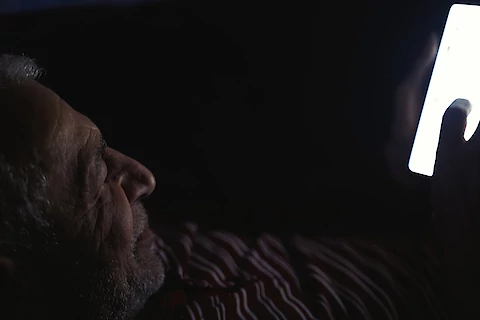
Are you experiencing trouble with your sleep? You are not alone. Many seniors face similar issues, and it may be due to something you least suspect: your electronic devices. These devices, such as televisions, computers, and smartphones, emit a form of light known as blue light. While our use of technology can be beneficial in numerous ways, the impact of blue light exposure on our sleep quality is a growing concern, especially among seniors.
Understanding Blue Light Exposure
Blue light is a high-energy visible light, characterized by short wavelengths. It is emitted by many of the devices that have become integral to our daily lives - from the television that keeps us entertained to the computers and smartphones that keep us connected. However, while this technology has its perks, there's growing concern over the impact of blue light exposure on our sleep quality, particularly among seniors.
The Impact of Blue Light on Sleep
Our bodies operate on an internal clock, known as the circadian rhythm. This rhythm dictates when we feel sleepy and when we feel awake. It's a delicate balance, one that blue light can easily disrupt. Research has shown that exposure to blue light in the evening, a common occurrence in our technological age, can confuse our internal body clocks. This can result in impaired sleep quality, a challenge that a significant number of seniors are grappling with.
Practical Tips for Reducing Blue Light Exposure
What can be done to mitigate the effects of blue light? One of the most effective strategies is to reduce screen time before bed. This doesn't mean you have to give up your evening television shows or late-night chats; instead, try to turn off the screens an hour before bedtime. This gives your body enough time to prepare for sleep.
Another helpful tactic in reducing blue light exposure is to use the built-in settings on your devices that decrease blue light emissions. Many smartphones and tablets have a 'night mode' or similar feature that lowers the amount of blue light they emit. Using these settings in the evening can help protect your sleep quality.
You may also want to consider removing devices that emit blue light from the bedroom, which can help you settle down when it's time to get ready for bed.
Alternatives to Screen Time Before Bed
Cutting down on screen time does not equate to a boring evening. There are plenty of enjoyable activities that you can engage in that don't involve screens. You could read a book, listen to calming music, or engage in gentle stretching exercises. If you enjoy puzzles, a game of Sudoku or a crossword puzzle could be just as engaging. These activities not only provide entertainment but also allow your body to unwind and prepare for sleep.
Home Care Help for Seniors
Improving sleep quality by reducing blue light exposure is an important aspect of maintaining overall health and well-being for seniors. Remember, it's all about balance. Engage with technology, but do so in a way that does not interfere with your natural sleep patterns.
Are you a senior living in Smithtown, Central Islip, Suffolk County, or Centereach? Senior Helpers Smithtown is here to aid you in navigating through this and other age-related concerns. Contact us today to learn more about our home care options and how they can improve your quality of life, leading to greater overall relaxation and comfort that may just make it easier to settle down for sleep at night.